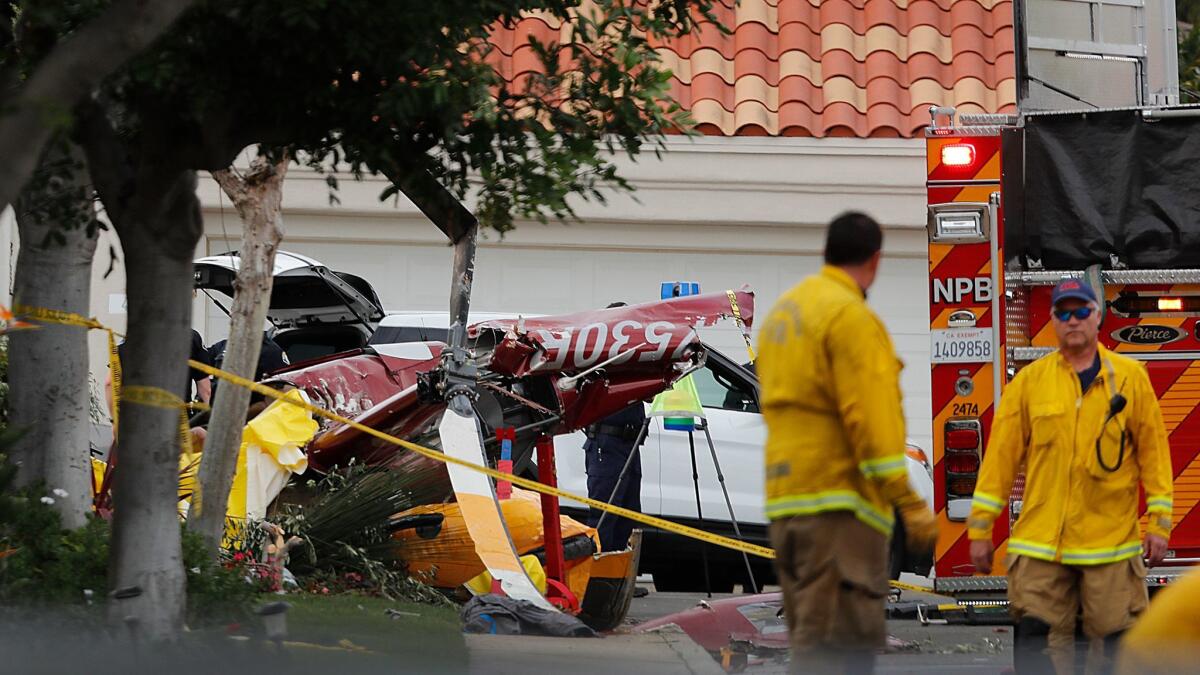FAA investigated safety complaints about company that operated helicopter that crashed into Newport Beach home, documents show

- Share via
The company that operated a helicopter that crashed into a home last week in Newport Beach, killing three people and injuring two others, was the focus of a Federal Aviation Administration investigation last year into allegations of improper maintenance, including on the copter that crashed, documents show.
Revolution Aviation, a flight school and touring company based at John Wayne Airport, had been leasing the four-seat Robinson R44 from Spitzer Helicopter LLC of Canyon Lake in Riverside County since April 2016.
On Jan. 30, the aircraft slammed into a house on Shearwater Place near Egret Court in Newport’s Bayview Terrace community. Authorities have not determined what caused the crash.
Joseph Anthony Tena, 60, of Newport Beach, who had an ownership stake in Revolution Aviation, was killed along with Kimberly Lynne Watzman, 45, of Santa Monica and Brian Reichelt, 56, of Hollywood, Fla., according to the Orange County Sheriff’s Department.
Records show that another copter Revolution Aviation operated crashed at Long Beach Airport in September.
Shortly before that crash, the FAA’s Long Beach flight standards district office inspected five of the helicopters Revolution Aviation operated, as well as all the company’s aircraft operations and maintenance records, according to an August FAA memo obtained by the Daily Pilot.
The investigation was launched in July after the agency received a complaint on its aviation safety hot line.
During a review of the R44 helicopter that eventually went down in Newport Beach, a maintenance inspector found that safety wiring on the engine’s valve covers did not meet FAA standards, the cooling fan nut spring pin (which helps keep the engine cooling fan in place) was not aligned with indicator marks on the aircraft, and torque striping required by the helicopter’s maintenance manual was missing on multiple critical fasteners, according to the memo. The striping makes movement of the fasteners easier to spot.
Jeffrey Rafferty, who at the time was the principal maintenance inspector with the FAA in Long Beach, wrote in the memo that he also substantiated some “nonspecific allegations in the complaint with regard to the operation of several helicopters that may not be in airworthy condition.”
For example, Rafferty wrote, a helicopter was flown after the deadline for its annual inspection had passed, which is against FAA regulations. He also wrote that some helicopter maintenance wasn’t being documented as required by the agency.
Rafferty went on to say that “Revolution Aviation has addressed all of the discrepancies brought to their attention by the [aviation safety inspectors] during the investigation and put new processes in place to reduce the likeliness of reoccurrence.”
An FAA representative declined to comment this week.
Jack Cress, a technology instructor at USC who teaches courses on helicopter and other aircraft accident investigations, said FAA investigations of the type performed on Revolution Aviation are not unusual.
He said the findings about the R44 helicopter weren’t particularly egregious. However, he said, it “certainly would be an invitation for a need for more scrutiny.”
“Anytime you run across something like that, it could imply a lack of attention to detail,” he said.
Anna Robinson, operations director at Revolution Aviation, wrote in a letter to Rafferty on July 31 that the company was notified of some of the issues before the investigation started and had already corrected them.
“No flight instructor or pilot performing his/her duties while working for Revolution Aviation knowingly, deliberately or carelessly operated any aircraft listed in your letter in unairworthy condition,” she wrote.
Robinson did not return a call seeking further comment this week.
After the crash in Newport Beach, Eric Spitzer of Spitzer Helicopter, which had leased the R44 to Revolution Aviation, called Revolution “spectacular.”
“The minute just a little thing goes wrong, they’re on it,” he said.
Revolution Aviation’s website states the company has a “100% safety record.”
However, a Robinson R22 Beta helicopter operated by the company crashed at Long Beach Airport about a month after the FAA’s investigation ended in August, according to the National Transportation Safety Board. The FAA had noted missing or incorrect torque striping on multiple critical fasteners on the R22.
The preliminary NTSB report on the crash said the student pilot suffered serious injuries.
The student told investigators that as he began to approach the landing pad at an altitude of about 40 feet, the helicopter began to shudder and a horn sounded warning of low rotor rpm. The student’s instructor told investigators that the nose began to shift to the left and right and the copter suddenly and rapidly descended, according to the report.
The aircraft, which also was registered to Spitzer Helicopter, hit the ground and rolled onto its side. The cause of the crash, which the NTSB is investigating, has not been released.
Twitter: @HannahFryTCN
All the latest on Orange County from Orange County.
Get our free TimesOC newsletter.
You may occasionally receive promotional content from the Daily Pilot.




